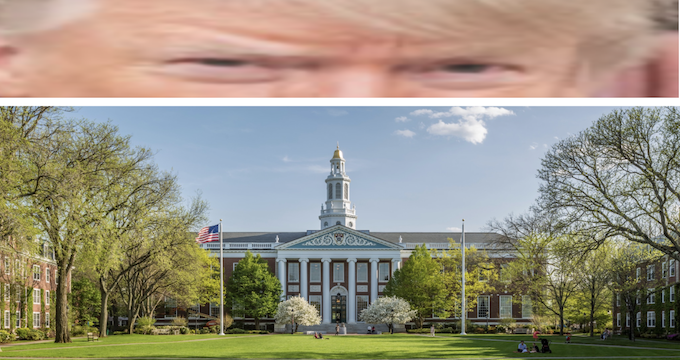Higher education is the latest frontline in Trump’s culture war—and fairness may be its first casualty. In a stunning 11 April 2025 letter, addressed to Harvard University, officials from multiple federal agencies demand nothing short of a cultural purge. Dismantle all DEI efforts, implement ‘merit-only’ admissions and hiring, and subject the university to ongoing surveillance-level audits to ensure compliance.
Weaponising ‘Merit’ Perpetuates Injustice in Education
The government demands Harvard must “cease all preferences based on race, colour, religion, sex, or national origin”. It must also shutter all DEI-related infrastructure, audit every hiring and admissions decision, and certify in writing that only meritocratic standards have been applied.
Similar mandates have been sent to Columbia University, the University of North Carolina, and Stanford University. These letters follow a now-familiar pattern: enforce a singular ideological vision that sidelines equity and weaponizes merit.
Harvard firmly rejected the demand. This came as little surprise given the growing calls for well-resourced universities to resist Trump’s intimidation. In retaliation, the Trump administration escalated its punitive measures. It froze approximately $2.2 billion in federal funding and initiating steps to revoke Harvard’s tax-exempt status. On May 22, 2025, the Department of Homeland Security revoked Harvard’s certification under the Student and Exchange Visitor Program (SEVP). This effectively barred the university from enrolling international students. .
The loss of funding, if extended across the sector, could deepen existing disparities in educational opportunities, particularly for low-income and minority students, thereby exacerbating barriers to access and success in higher education.
Now Harvard is suing the Trump administration.
The Myth of Meritocracy
To understand the threat these letters pose, we must first interrogate what ‘merit’ really means. In popular usage, merit implies a neutral, objective measure of individual talent and effort. In educational settings, it is commonly reduced to test scores and other standardized metrics. But as a growing body of scholarship has shown, these metrics are far from neutral.
In The Tyranny of Meritocracy, Lani Guinier argues that standardised tests are not measures of intelligence or potential. Instead, they are proxies for privilege—predicting parental income better than future performance. Likewise, in The Meritocracy Trap, Daniel Markovits details how elite meritocratic institutions reinforce class stratification by rewarding access rather than ability.
In this light, insistence on ‘pure’ merit is deeply misleading. It erases history and context, treating unequal outcomes as evidence of unequal effort. It ignores how merit is built over time—through supportive learning environments, stable housing, nutrition, mentorship, and emotional security. The focus on merit dismisses early disadvantage and inhibits the cultivation of talent.
Merit is Nurtured, Not Discovered
The concept of meritocracy presumes that talent naturally rises to the top. But talent doesn’t flourish in a vacuum. It must be cultivated through consistent access to opportunity, support, and inclusion—conditions that are often absent in structurally disadvantaged communities.
When merit is stripped of its social and historical context, it becomes a dangerous fiction. Rewarding achievement without acknowledging the unequal conditions under which it is attained serves only to entrench existing inequalities. A test score, for instance, is not an objective measure of potential; it is a snapshot shaped by access to resources, quality of preparation, levels of stress, and available social capital.
As Reardon has shown, income inequality is strongly correlated with educational achievement gaps, with the advantages of high-income families compounded over time through enriched learning environments and better-resourced schools. A student growing up in an overcrowded home, attending an underfunded school, and dealing with chronic insecurity must navigate immense challenges just to show up.
Why Merit Needs a Reality Check
There are many reasons for society to be cautious about the ideology of meritocracy.
First, merit without context reinforces inequality. When policies treat merit as a pure, context-free measure of worthiness, they inadvertently reward privilege and punish adversity. Being reasonable about merit means acknowledging the uneven playing field and incorporating social context into how we recognise potential.
Second, merit is not a static quality that individuals possess—it is a product of opportunity, mentorship, support, and institutional access. As Nobel Prize-winning economist and philosopher Amartya Sen argues, fairness in outcomes requires fairness in the development of capabilities. Recognizing this means shifting away from rigid metrics toward more holistic assessments that appreciate diverse forms of intelligence and contribution. A reasonable approach to merit understands it as nurtured, not inherent, and therefore calls for proactive measures to expand the conditions under which merit can flourish.
Third, an uncritical adherence to meritocracy can ossify privilege, reinforce structural disadvantage, and strip away the very empathy and solidarity necessary for democratic life. Sociologist Michael Young coined the term meritocracy to warn society that excessive faith in merit can breed new forms of elitism and exclusion.
What Should be Done
True merit is not discovered; it is developed. It is not individual; it is social. It is not neutral; it is shaped by history. To honour merit is to invest in justice, support inclusion, and cultivate excellence everywhere—not just in those already deemed deserving. Meritocracy needs to be contextualised.
The backlash politics unfolding in the United States is already undoing decades of progress in civil rights and social justice. Australia cannot afford to be complacent. We must remain vigilant to ensure that similar regressive currents do not take hold in our institutions.
In particular, Australian universities must recognise that true merit does not emerge in a vacuum. It must be actively cultivated through equity-driven supports and inclusive policies—not simply assumed through standardised tests or conventional metrics that often reflect entrenched privilege more than potential.
With its renewed mandate to govern, Labor must now deliver on its promise to break down “the invisible brick wall” that “stops a lot of people from poor families, the outer suburbs, and the regions from getting to the front door“.

Tebeje Molla is a senior lecturer in the School of Education, Deakin University. His research areas include student equity, teacher professional learning, and policy analysis. His work is informed by critical sociology and the capability approach to social justice and human development.






Well done, Tebeje this is great